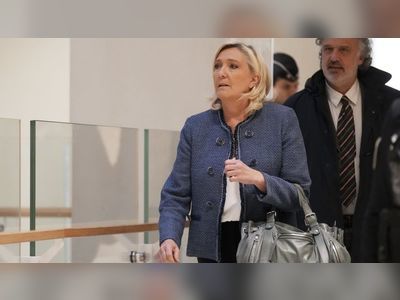
Japan, South Korea, and China Seek to Accelerate Free Trade Agreement Amid U.S. Tariff Policies
Meeting in Seoul highlights concerns over rising U.S. tariffs as the three Asian nations aim to boost economic cooperation.
In a significant development regarding trade relations in East Asia, the trade ministers of Japan, South Korea, and China convened in Seoul on March 30, 2025, to discuss enhancing their economic cooperation in light of escalating U.S. tariffs.
This meeting, the first of its kind since 2020, comes as the economic dependencies of these nations on exports render them vulnerable to U.S. trade policies under President Donald Trump.
South Korean Industry Minister Ahn Duk-geun, Japanese Economy, Trade, and Industry Minister Yoji Muto, and Chinese Commerce Minister Wang Wentao highlighted their mutual need to provide a 'predictable environment' for businesses and expressed intentions to 'accelerate negotiations towards a comprehensive and fair trilateral free trade agreement.' Negotiations for such an agreement originally began in 2013 but stalled in 2019, only to be revived following a summit of leaders from the three countries in 2024.
The ministers emphasized their commitment to 'ensure fair global competition conditions' to promote a trade and investment environment that is free, open, equitable, non-discriminatory, transparent, and inclusive.
This is set against the backdrop of heightened tariff measures from the U.S., which have created an atmosphere of uncertainty for businesses in the region.
The three nations are pursuing increased cooperation to strengthen the stability of supply chains, improve communication regarding export controls, and address the rising tide of unilateralism and protectionism.
According to the Chinese government, this trend is severely impacting global trade and increasing uncertainty, making it essential for these countries to advocate for the preservation of the multilateral trading system.
Collectively, China, Japan, and South Korea represent about 20% of the world’s population, a quarter of the global economy, and 20% of global trade.
In recent weeks, the United States has implemented 25% tariffs on steel and aluminum, with additional tariffs on imported cars set to begin on April 2, 2025, impacting a significant portion of automotive imports from both Japan and South Korea.
Japan and South Korea account for 16% and 15% respectively of total U.S. automotive imports, a crucial sector for their economies.
Meanwhile, China faces a total tariff rate of 20% on its exports to the U.S., underscoring the urgency of the current discussions.
The trilateral meeting occurred shortly after announcements of an ongoing dialogue between the U.S. and the UK regarding tariffs, with both sides signaling productive negotiations toward a bilateral economic agreement.
British Prime Minister Keir Starmer and President Trump acknowledged the ongoing discussions while German Chancellor Olaf Scholz expressed the European Union's readiness to respond decisively to U.S. tariff actions while remaining open to compromise.
In France, government officials have expressed strong opposition to U.S. interference regarding corporate diversity policies, highlighting a broader international response to perceived U.S. economic overreach under the current administration.
French companies received notices suggesting compliance with U.S. diversity initiatives, further igniting tensions over transatlantic trade relations.
This meeting, the first of its kind since 2020, comes as the economic dependencies of these nations on exports render them vulnerable to U.S. trade policies under President Donald Trump.
South Korean Industry Minister Ahn Duk-geun, Japanese Economy, Trade, and Industry Minister Yoji Muto, and Chinese Commerce Minister Wang Wentao highlighted their mutual need to provide a 'predictable environment' for businesses and expressed intentions to 'accelerate negotiations towards a comprehensive and fair trilateral free trade agreement.' Negotiations for such an agreement originally began in 2013 but stalled in 2019, only to be revived following a summit of leaders from the three countries in 2024.
The ministers emphasized their commitment to 'ensure fair global competition conditions' to promote a trade and investment environment that is free, open, equitable, non-discriminatory, transparent, and inclusive.
This is set against the backdrop of heightened tariff measures from the U.S., which have created an atmosphere of uncertainty for businesses in the region.
The three nations are pursuing increased cooperation to strengthen the stability of supply chains, improve communication regarding export controls, and address the rising tide of unilateralism and protectionism.
According to the Chinese government, this trend is severely impacting global trade and increasing uncertainty, making it essential for these countries to advocate for the preservation of the multilateral trading system.
Collectively, China, Japan, and South Korea represent about 20% of the world’s population, a quarter of the global economy, and 20% of global trade.
In recent weeks, the United States has implemented 25% tariffs on steel and aluminum, with additional tariffs on imported cars set to begin on April 2, 2025, impacting a significant portion of automotive imports from both Japan and South Korea.
Japan and South Korea account for 16% and 15% respectively of total U.S. automotive imports, a crucial sector for their economies.
Meanwhile, China faces a total tariff rate of 20% on its exports to the U.S., underscoring the urgency of the current discussions.
The trilateral meeting occurred shortly after announcements of an ongoing dialogue between the U.S. and the UK regarding tariffs, with both sides signaling productive negotiations toward a bilateral economic agreement.
British Prime Minister Keir Starmer and President Trump acknowledged the ongoing discussions while German Chancellor Olaf Scholz expressed the European Union's readiness to respond decisively to U.S. tariff actions while remaining open to compromise.
In France, government officials have expressed strong opposition to U.S. interference regarding corporate diversity policies, highlighting a broader international response to perceived U.S. economic overreach under the current administration.
French companies received notices suggesting compliance with U.S. diversity initiatives, further igniting tensions over transatlantic trade relations.











